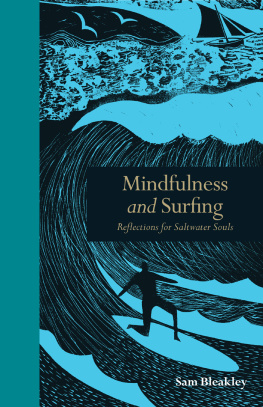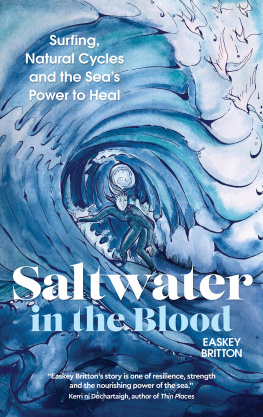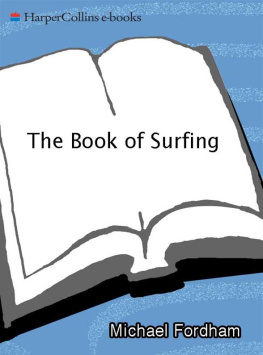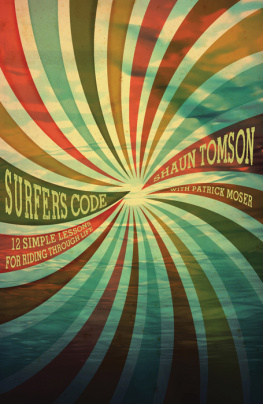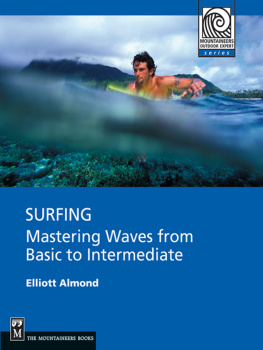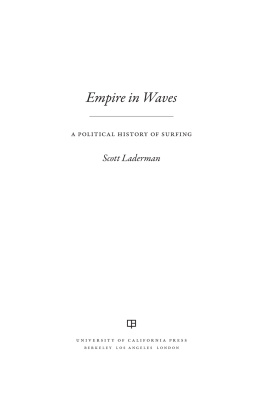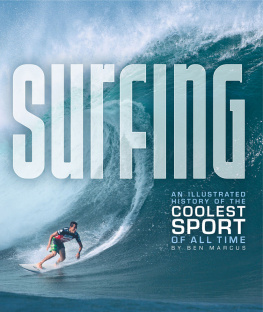
Mindfulness and Surfing
Reflections for Saltwater Souls
Sam Bleakley

Leaping Hare Press
Sam Bleakley is a writer and international longboard surfing champion. He has surfed the shores of more than 60 countries and written several surfing books. Sam is a specialist on emerging surf cultures, with particular interest in a new wave of Asian surfers who advocate the ancient practices of mindfulness in Buddhism and Taoism.
First published in the UK in 2016 by
Leaping Hare Press
210 High Street, Lewes
East Sussex BN7 2NS, UK
www.leapingharepress.co.uk
Text copyright Sam Bleakley 2016
Design and layout copyright Ivy Press Limited 2016
All rights reserved. No part of this book may be reproduced or transmitted in any form or by any means, electronic or mechanical, including photocopying, recording or by any information storage and retrieval system, without written permission from the copyright holder.
British Library Cataloguing-in-Publication Data
A catalogue record for this book is available from the British Library
Print ISBN: 978-1-78240-329-6
EPUB ISBN: 978-1-78240-411-8
MOBI ISBN: 978-1-78240-412-5
This book was conceived, designed and produced by
Leaping Hare Press
Publisher S USAN K ELLY
Creative Director M ICHAEL W HITEHEAD
Editorial Director T OM K ITCH
Commissioning Editor M ONICA P ERDONI
Art Director W AYNE B LADES
Project Editors J AYNE A NSELL , J OANNA B ENTLEY
Editor J ENNI D AVIS
Designer G INNY Z EAL
Illustrator M ELVYN E VANS
C ONTENTS

CHAPTER ONE

T AKING O FF
Every surfer craves the experience of surfing with dolphins, or sitting close to basking sharks in blue-green water. I have surfed with dolphins, seals, sharks and sea snakes. I have sensed the sudden suspension of time sought by all meditative techniques deep inside the tube; and been clipped by that same wave, then dragged across a razor-sharp live coral reef as the water curtain falls to the sea gods applause. I have nearly drowned at the hands of powerful waves and saved another from drowning. And I have seen suffering men and women reborn and healed through surfing.

O CEAN H EALING

When I take off on a wave, poised on a sliver of surfboard, I am both fish and bird. On each occasion of bliss and fear, I am educated into the complex ways of the sea a constant lesson in mindfulness.
M INDFULNESS IS USUALLY DESCRIBED as an inward-looking process of stopping, reflecting and clearing the mind in learning a discipline of meditation or Zen awareness. Among the hustle and bustle of contemporary life, moments of stillness can help us to regain a sense of self, of composure or centring. Mindfulness has also been used widely to combat anxiety and depression.
Surfing as mindfulness, however, does something a little different. It does not simply take us inside ourselves to find a still centre, but rather orients us within the environment to find place. We are immersed in water and the salt-soaked zone just above the seas skin. Around us, terns dive and fish jump. We are active, alert and intent on balance. Mindfulness in surfing is then, paradoxically, a moving out of mind into the world, moving against the grain of inner-directed thought and reflection into an acute sense of what the environment demands of us where winds, currents, beach shapes, wave types and lunar-tidal movements meet. In this sense, we move from egology to ecology and we generate a bodymindfulness, locating ourselves in place and space.
From Ego to Eco
For over two thousand years the Western world has developed techniques of focus on the self and the inward life. The invention of autobiography as a literary genre in the eighteenth century and its perfection in personal-confessional styles across all media such as kiss-and-tell journalism, selfies or YouTube videos has, arguably, dried up our receptivity to the outer world as we become acutely sensitive to the inner life. As a result, we have an egological surplus and an ecological crisis. We need to recover sensitivity towards the world around us its cries and pleasures, its sufferings and beauties. Surfing is an ideal way to do this as a mindfulness given by nature. The saltwater soul of surfing is to be mindful of natures body as we cultivate a bodymind.
As a novice, you will spend far more time spilled into the sea than standing on your board surfing a wave, and so the apprenticeship into an ecological perception, or being mindful of natures body, can be tough and uncomfortable especially in cold seas and even in state-of-the-art wetsuits. But as you gain expertise so you will gradually gain a more graceful, elegant and inventive approach to how you relate to waves in other words, you will develop a mindfulness in the ocean. It is the ocean and not surfing instructors that will teach you this mindfulness, and to which you must adapt. As expertise develops, the surfer becomes a connoisseur of the oceans, tutored and formed by them.
Outside-In
The psychologist James Gibson (190479) revolutionized the way we think about perception in his model of ecological perception. In Gibsons view, the world is not passively received by the senses and then processed cognitively via the brain and central nervous system this is an inside-out perspective. Rather, the world actively educates our attention to its shapes, patterns, motions, colours, smells, tastes, vibrations, rhythms, oscillations and (dis)appearances. The world captures our attention, shaping and dictating what and how we sense. Further, the senses do not act independently but in concert as a sensorium or a total system, again shaped by environmental affordances, as Gibson described them patterns of attraction that draw us to them and make us notice.
Educated by the Ocean
The sea and its waves, formed by storms in deep water and fetched along miles of open ocean to unfold on reefs and coasts, are largely untouched by human culture in its energies and forms, even if there is pollution and rising sea levels through global warming. Pitching back in to the natural world of the ocean and its patterns moves us closer to an ecological perception without the filter of cultural perception. Surfing brings you face to face with the raw beauty of nature at different volumes and tones, and in this setting there is the opportunity to be mindful not by moving inwards to the self but by adapting to what the environment affords. The ozone-filled environment, the salt-stained bath, the imminent contact with sea life, the swell of the waves all of this places the surfer, beginner, intermediate or expert, into a mindfulness relationship with the environment as an ecological rather than egological activity. As one is taught and shaped by the ocean its waves, currents, tides, sea life, colours, temperatures, forms and patterns so one becomes more tuned to its needs and then more ecologically minded and sensitive. As the elegance, determination, skill and courage of the surfer grow, so s/he becomes more environmentally aware as a form of external mindfulness.
Next page
